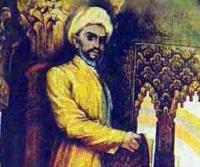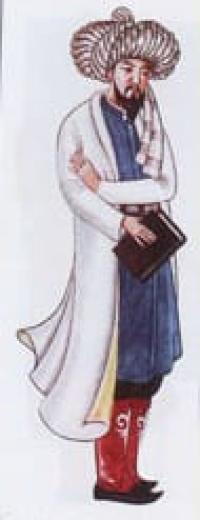You are here
Yusuf Balasaguni.


Outstanding people in history of Kyrgyzstan.
"I strove for knowledge
with a persistent desire, I strung together word after word
with a patterned syllable, The word grazed
like a mountain deer, And I tamed it,
made it obedient"
Yusuf Balasaguni.
Tours in footsteps of outstanding people of Kyrgyzstan.
Life and work of the outstanding poet and thinker, who lived in the XIth century, Yusuf (Dzhusup) Balasaguni, are inextricably linked with the history of the city of Balasagun. According to some scientists, Dzhusup Balasagyn was born approximately in 1010 - 1016 - 1086 in the city of Balasagun, in whose honor he received his nickname, known under the name Kuz-Ordu, the location of which has not been established with sufficient certainty.
Presumably, this city should be sought in Semirechye, in the Chui Valley, not far from the modern city of Tokmak (Kyrgyzstan). Balasagun was one of the largest cities, a major trade and craft center of the Karakhanid state. In ethnogenetic terms, it was an association of several Turkic tribes that rose to prominence at the beginning of the Xth century and existed for three centuries.
The socio-economic basis of the Khaganate was a specific combination of nomadic and sedentary economy. Yusuf Balasaguni came from a specific cultural zone and political region, which at one time included Otrar (Farab), Shash (Tashkent), Taraz, the Chui Valley, Issyk-Kul, Fergana, and Kashgari. In cultural and linguistic terms, he is the common ancestor of the Turkic-speaking peoples, and geographically, he is close to the Kazakhs and the Kirghiz, specifically to the Turkic tribe of Chigils.
Yusuf Balasaguni received his education in the recognized cultural centers of that time - Farab, Kashgar, Bukhara. Fluent in Arabic and Persian, he wrote philosophical and scientific works on various branches of knowledge. Secular people of that time were distinguished by the versatility of their interests, being fond of poetry and politics, along with philosophy and science, and playing chess.
Broadly educated, wise with life experience, he arrived in Kashgar and here, over the course of eighteen months of intense work, he wrote a large poetic work. He dedicated his famous work to Tabgach-Bogra-Kara-Khakan-Ali Hasan from the Karakhanid dynasty, for which the poet was granted the title of hass-hajib - "minister of the court" or "chief chamberlain".
The young poet received his primary education in his hometown, and his higher education in the city of Kashgar. Like other famous scholars, he graduated from the Sajiye Madrasah (Radiating Madrasah). He composed his poem "Kutadgu Bilig" ("Blessed Knowledge") when he was already over fifty.
Some scholars suggest that Yusuf also wrote the works "Book on Politics" and "Book on the Encyclopedia". Unfortunately, these works of the thinker disappeared without a trace. At the time of writing the poem, Jusup was 54 years old. Having started writing it in the city of Balasagun, he finished the poem in Kashgar, spending 18 months on its description.
Dzhusup presented his creation to the ruler of Kashgar Tavchak Buura Karakhan Abu Ali Hasan, whom the people called the khan of khans. Having understood the deep meaning of the poem, the khan, in honor of the merits of its creator, awarded him the title of "Great Hass-Khadzhiv", a very high title of a courtier.
In the XIth century - in 1069 - 1070 - the first poem in the Turkic language appears. It was written by a native of Balasagun, Yusuf. He called the poem "Kutadgu bilig" ("Blessed knowledge") and presented it as a gift to the Karakhanid kagan Tavgach-Bogra-Kara-khakan.
He granted the poet the court rank of khass-hajib (minister of the court). Information about Yusuf Balasaguni can be gleaned from the poem itself. Not a single eastern biographer or bibliographer mentions him. Meanwhile, the researcher of the poem A.N. Kononov writes that Yusuf Balasaguni "was an outstanding poet, a highly educated person, a scholar-encyclopedist, a poet who mastered all the subtleties of Arabic and Persian poetry and Turkic folklore; he was knowledgeable in astronomy and mathematics, in medicine, in the game of chess and folk sports and in much, much more."
Universal human ideals were reflected in "Kutadgu Bilig", the lines of the poem subsequently became folk proverbs and sayings. The poet from Balasagun was the first to introduce the Turkic language into literature along with the then dominant Arabic and Persian languages.
The poem belongs to the ethical-didactic (instructional) genre, popular in the Middle Ages in the East. Yusuf Balasaguni in rhymed couplets (bayts) outlined his understanding of a just state where everyone can live happily. According to scientists, Yusuf completed the poem at about 53 - 54 years of age.
According to some sources, Yusuf Balasaguni died at the age of 68 and was buried in the southern city of Kashgar, in the Tai Nap area. During the years of the "cultural revolution" in China (late 1960s), the Balasaguni mausoleum was destroyed by the Red Guards. It has now been restored.
All are mortal and only the good name of the One who was famous for his deeds is eternal. Yusuf Balasagyn died approximately after 1070.
Authority:
Hanif Abdurakhman. https://vk.com/topic-12003611_22517876







